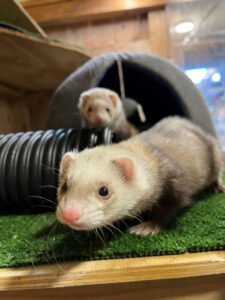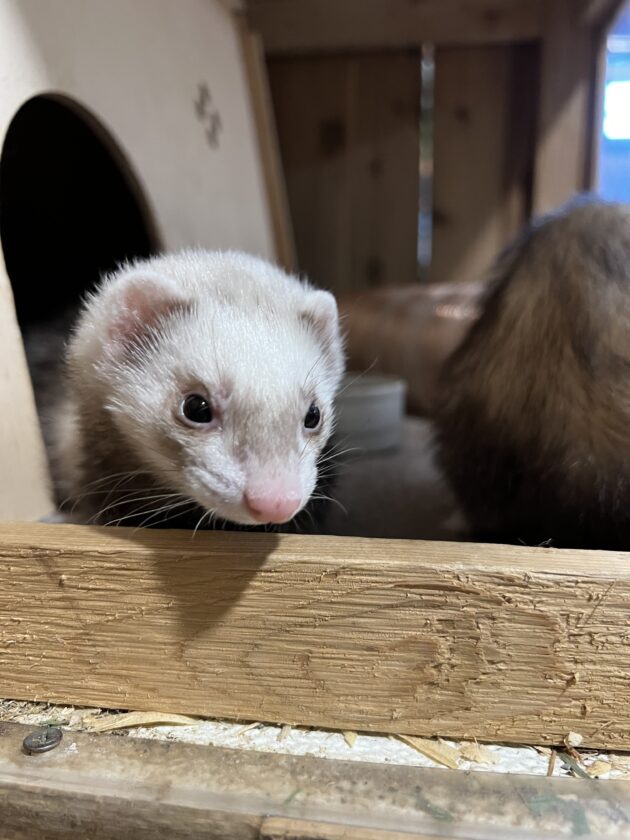Prairie Park Nature Center hosting 2 European ferrets used in cloning program to save endangered species

photo by: Courtesy City of Lawrence
Prairie Park Nature Center has been selected as a permanent loan site for two European ferrets used in cloning program to help save endangered black-footed ferret.
Story updated at 4:27 p.m. Thursday, March 30:
Two European ferrets who “retired” to Lawrence last week have already begun a thriving second career: as teachers.
“They’ve already done their first program,” said Marty Birrell, the nature education supervisor at Prairie Park Nature Center, referring to an educational event starring the slinky weasels, Lizzie and Annie, who are now under her care.
The ferrets’ first career was as mothers — very distinguished mothers — at the U.S. Fish and Wildlife Service’s National Black-Footed Ferret Conservation Center in Wellington, Colorado, where the pair were part of a historic project to clone the endangered black-footed ferret.
The project’s result was Elizabeth Ann, a black-footed ferret born in 2021 — the first of any native, endangered animal species in North America to be cloned. Lizzie carried Elizabeth Ann and her littermates in her womb as a surrogate and gave birth by C-section. Annie then stepped in as a nursing surrogate because the C-section prevented Lizzie from doing so.
Now Lizzie and Annie, both spayed, are slated to live out their remaining lives (likely another five years or so) doing what lots of retirees do: telling youngsters about their big accomplishments — in their case, helping to save an entire species from extinction.
The two arrived at Prairie Park Nature Center on March 23 after the center was selected as a permanent loan site by the U.S. Fish and Wildlife Service. The intention, Birrell said, was to use the ferrets “to get word out about using genetic technology to save endangered species.”
“Kids love to talk about clones,” she said, “and they, as well as adults, have a natural curiosity around all this.”

photo by: Sydney Clem/Prairie Park Nature Center
One of the European ferrets used in a cloning program to help save the endangered black-footed ferret is pictured at Prairie Park Nature Center.

photo by: Sydney Clem/Prairie Park Nature Center
Prairie Park Nature Center has been selected as a permanent loan site for two European ferrets used in cloning program to help save endangered black-footed ferret.
Right now the ferrets, who are on public display, are getting used to their new — and bigger — home, but they will become an integral part of the center’s educational programming on habitat conservation and other topics.
“They’re having fun investigating their enclosure and playing with new toys,” Birrell said. “The two are very bonded; one of the stipulations was that they stay together.”
Eventually, Birrell hopes to introduce Annie and Lizzie to the center’s other European ferret, Nugget, who has been living alone.
She said that European, or domestic, ferrets, unlike black-footed ferrets, are “very social,” and she hopes the three girls will bond.
The nature center has also housed a black-footed ferret since April 2012, and current resident Pancake, also a retiree, has been helping educate people about the species’ plight.
Pancake won’t be mixing with the others, though, as black-footed ferrets are solitary, Birrell said, and are really “different in many ways” from domestic ferrets.
Black-footed ferrets in the wild today number only in the hundreds, experts believe.
They are North America’s most endangered mammal. Some that were bred in captivity have been released into the wild in 11 states, including Kansas. The Kansas reintroduction program, located in Logan County, began in 2007 and is being monitored carefully to determine its success.
The black-footed ferret is largely nocturnal, and its diet is largely composed of prairie dogs, which are twice the size of ferrets, Birrell said, noting the little mammal’s toughness.
Pancake, however, lives on thawed rodents at the nature center, Birrell said, while his domestic friends rely on a diet of “kibble” for ferrets.
As for Elizabeth Ann, the cloned ferret made possible by Lizzie and Annie, Birrell said she’s still in Colorado.
“She turned out to be unusually aggressive and refused to breed,” Birrell said, and it was discovered that her uterus had an abnormality. She has now been spayed, but the conservation center is hoping that her eggs can still be used to help perpetuate her species.
The Prairie Park Nature Center, 2730 Harper St., is open from 9 a.m. to 5 p.m. Tuesday through Saturday and from 1 to 4 p.m. on Sunday.

photo by: Sydney Clem/Prairie Park Nature Center
One of the European ferrets used in a cloning program to help save the endangered black-footed ferret is pictured at Prairie Park Nature Center.

photo by: Sydney Clem/Prairie Park Nature Center
One of the European ferrets used in a cloning program to help save the endangered black-footed ferret is pictured at Prairie Park Nature Center.







